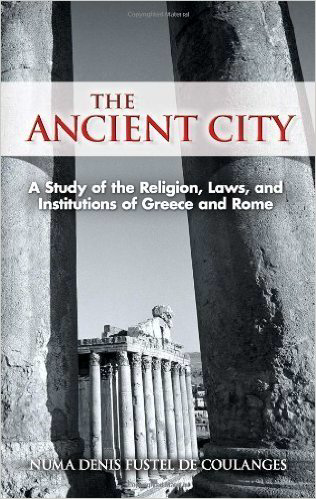Part of the Casswiki article series Books

The Ancient City: A Study on the Religion, Laws, and Institutions of Greece and Rome is a book by French historian Fustel de Coulanges, first published in 1864. Here, the author investigates the origins of the ancient institutions of Greek and Roman society and agrues that primitive religion played a major role in the political and social evolution of Greece and Rome.
From Laura Knight-Jadczyk’s review on Amazon:
One of the Best and most Instructive Books Ever Written
I read references to the work of Fustel de Coulanges in the writings of the great and heroic French historian, Marc Bloch, (The Historian’s Craft) and was intrigued enough to get and read it. What an eye-opener! It is undoubtedly among the top 10 seminal historical works ever written, in my opinion. Considering the data that Fustel did not have access to, for which some criticize him, makes this achievement even that much more impressive. His thought revealed in his writing is clear, insightful, brilliant.
What you will find in this book is a masterful story of the descent of the many institutions to which we are still heir though the context and specific manifestations have changed. In many cases, we believe things about why this or that custom has always been with us that are wrong, and Fustel sets out the evidence for what is really behind such things as marriage ceremonies, carrying the bride over the threshold, the foundations of the legal system including why it was the eldest son who got everything for thousands of years, and so forth. There are many questions about why things are the way they are answered in this book.
As other reviewers have noted, there are many descriptions in The Ancient City that will bring elements of the Bible to mind. The big question nowadays is: did the Bible borrow from other stories and cultures to create a “history of Israel” that never actually happened? Were some of those stories Greek? And were the Greek stories influenced by elements from Anatolia and Mesopotamia, coming to the Bible by a circuitous route? Did the authors of the Septuagint borrow from Homer and Herodotus?
These are all questions that are interesting and can be better formulated by also reading Russel Gmirkin’s book, Berossus and Genesis, Manetho and Exodus: Hellenistic Histories and the Date of the Pentateuch and Bruce Louden’s book, Homer’s Odyssey and the Near East.
Despite some of the nit-picking criticisms that have been directed at Fustel over the years, I’ve never found a significant argument that Fustel got it wrong. His sweeping overview of “how things must have happened” by taking what we know and back-engineering it, is amazing. Everyone should - and can - read it because Fustel was not a stuffy academic who wanted to wrap bizarre ideas in obscure language: he wanted to set out a rational view of why our culture is the way it is which can seem to be totally irrational until you understand what is behind things. If he had had knowledge of periodic cosmic catastrophes such as those explicated in the works of Victor Clube and Bill Napier, (The Cosmic Serpent) as well as Firestone, West and Warwick-Smith (The Cycle of Cosmic Catastrophes), he would have been able to take the topic to its most basic level: fear of death manipulated by individuals seeking power. For that part of the story, you need to read Becker’s Escape from Evil.
In any event, The Ancient City is definitely a big piece of the puzzle. If you read the works of Julius Caesar, you will want to read Fustel first so as to better understand that most amazing of heroes, the one who could have saved Rome had the wealthy elite not been so greedy and psychopathic, and had he not been so humane and forgiving.
In short, in order to understand a lot of things about ancient history, the history of Rome, and our own civilization which is the daughter of Rome, you need to read Fustel. And you will enjoy it and be glad you did!
This book is available as a free PDF download or can be read on Internet Archive.
Further readings
See also
- History
- Julius Caesar
